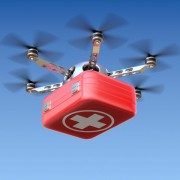Medical Care , News & Innovation , Health Screening
Blood delivery drone due to become world’s fastest
New-generation drones slash delivery time of life-saving blood products and medicines in hard-to-reach areas in Rwanda

Silicon Valley-based Zipline will later this year begin delivering medicine and blood products to some of the most remote places by using the world’s fastest commercial drone.
The company already makes thousands of deliveries per year in countries like Rwanda, but the new generation of autonomous aircraft will be able to fly farther, faster and with more cargo, and even also operate across America.
The new aircraft’s capabilities will decrease the amount of time between the receipt of an order and launch of a fulfilment flight from 10 minutes to one. It will also increase the number of daily delivery flights that each distribution centre can make from 50 to 500, and expand the radius of each centre to serve populations of up to 10 million people, the company said in a press release.
“Our first-generation aircraft and logistics system allowed us to create the first and only drone delivery service in the world, which is helping to save lives in Rwanda every day,” said chief executive Keller Rinaudo.
“We’ve taken everything Zipline has learned making thousands of critical deliveries and flying hundreds of thousands of kilometres, and redesigned our entire system and operation from top to bottom.”
In 2016, the company launched the world’s first national drone delivery operation in Rwanda, where it established a distribution centre with 15 drones to deliver blood, plasma and platelets to 21 hospitals across the western half of the country.
Since launching the service in Rwanda, Zipline has flown 300,000 kilometres, delivering 7,000 units of blood over 4,000 flights—approximately a third of which have been in emergency life-saving situations.
The company is now delivering more than 20 percent of Rwanda’s blood supply outside of the capital, Kigali. In addition to its impact on lifesaving emergency situations, Zipline’s drone delivery has helped transform the country’s medical supply chain, it said.
To date, instant drone delivery has helped ensure that hospitals have access to blood products, increasing the use of some blood products by 175 percent and reducing waste and spoilage by over 95 percent.
Zipline is in the process of opening its second distribution centre in Rwanda, which will help bring the entire country within range of its life-saving service.
Its new delivery vehicle is an autonomous fixed-wing style airplane that is capable of flying at a top speed of 128 km/h with a round trip range of 160 kilometres carrying up to 1.75 kilos of cargo. The new plane is capable of flying four times faster than the average quadcopter drone and can serve an area 200 times as large.
The company is working with state governments across America to launch its medical drone delivery as a part of a Federal Aviation Administration programme to accelerate the development of commercial drone innovation in the country.
“Billions of people on earth lack access to critical medicine,” said Rinaudo. “In East Africa, Zipline’s drones bring people the medicine they need, when they need it in a way that reduces waste, cost and inventory while increasing access and saving lives.”
Related Articles
Medical Care
Better use your nose
In the long term, mouth breathing might lead to several complications
Read moreMedical Care
Better sleep can improve sex
Experts say that better sleep and better sex are linked
Read moreMedical Care
Alzheimer’s-like neurological disorder identified
Scientist's discovery of ‘Primary Age-related Tauopathy’ may lead to new treatments
Read moreLatest Articles
Medical Care
Clinical Exercise Physiologist (CEP): The Emerging of Exercise is Medicine
How Exercising can be a Medicine
Read moreMedical Care
Reversing type 2 Diabetes: Embracing Hope and Determination
Experience the remarkable journey of Ash and his grandfather Atok as they conquer type 2 diabetes through unconventional methods, showcasing the power of love and determination over adversity.
Read moreMedical Care
Bladder Cancer: What You Need to Know
Empower yourself with our comprehensive guide to bladder cancer. Explore symptoms, diagnosis, treatments, and supportive resources to safeguard your health.
Read more